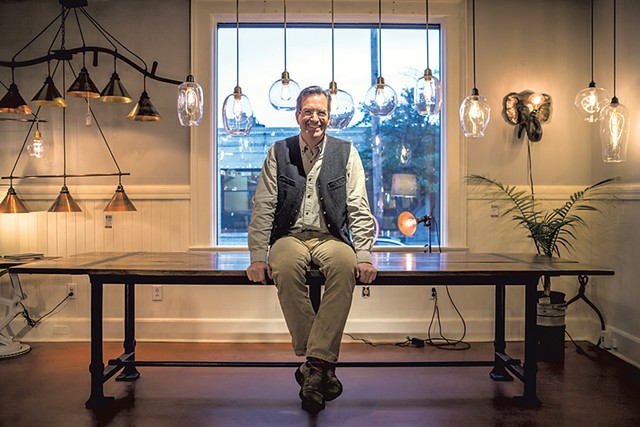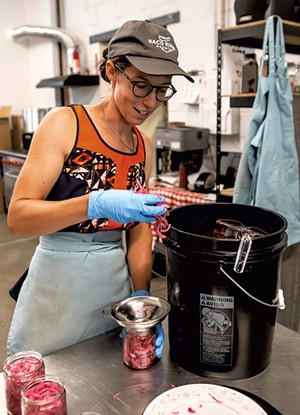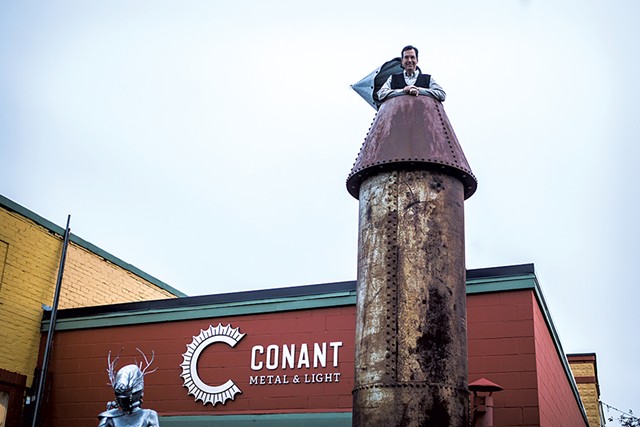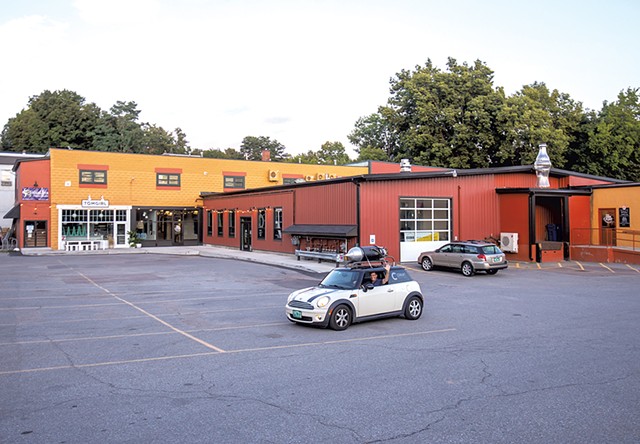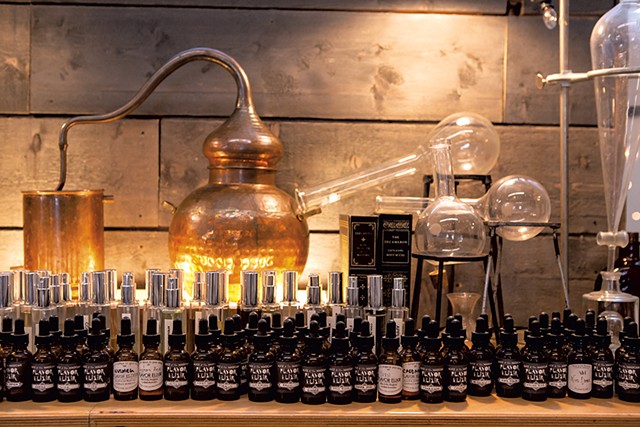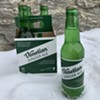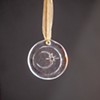Switch to the mobile version of this page.
Vermont's Independent Voice
- News
- Arts+Culture
- Home+Design
- Food
- Cannabis
- Music
- On Screen
- Events
- Jobs
- Obituaries
- Classifieds
- Personals
Browse News
Departments
Browse Arts + Culture
View All
local resources
Browse Food + Drink
View All
Browse Cannabis
View All
-
Culture

'Cannasations' Podcaster Kris Brown Aims to 'Humanize'…
-
True 802

A Burlington Cannabis Shop Plans to Host…
-
Business

Judge Tosses Burlington Cannabiz Owner's Lawsuit
-
Health + Fitness

Vermont's Cannabis Nurse Hotline Answers Health Questions…
-
Business

Waterbury Couple Buy Rare Vermont Cannabis License
Browse Music
View All
Browse On Screen
Browse Events
Browse Classifieds
Browse Personals
-

If you're looking for "I Spys," dating or LTRs, this is your scene.
View Profiles
Special Reports
Pubs+More
The Evolution of Steve Conant, the Soda Plant and Burlington's South End
Published October 30, 2019 at 10:00 a.m.
In the 1980s and early '90s, Burlington craftsman and entrepreneur Steve Conant kept in his car a small brass thermometer he'd picked up at a garage sale or antique store.
By then, Conant already had a reputation around the Queen City for refurbishing and selling old metal goods and crafting the funky, unique light fixtures that adorned many downtown restaurants and bars. He had acquired, polished and resold many brass objects in his travels, but this one he chose to keep. In the thermometer's classic, utilitarian design — a simple glass tube with a brass holder — he saw potential for a new product with broad consumer appeal and an opportunity to take his business in a new direction.
By 1992, Conant Custom Brass, as the business was then called, had landed an order from retail giant L.L.Bean to make 12,000 replicas of that thermometer. Soon Smith & Hawken, a national mail-order company, was placing orders for thermometers, too.
"It absolutely took off," Conant said. "I thought I must be a wizard, because people liked what I liked."
This wasn't the first time Conant had remade his company, and it wouldn't be the last. That little brass thermometer is emblematic of his business acumen. A consummate maker and entrepreneur, Conant has an intuitive ability to gauge changing consumer tastes and shifting market forces that helps him chart a course out ahead of the trends.
The evolution of Conant and his company, today called Conant Metal & Light, could be taught in business schools as a case study in nimble entrepreneurship. Arts programs and trade schools could also use it as a model of how to make a living as an artist or craftsperson.
Over four decades, Conant's creations have become fixtures of Burlington's South End Arts District. Among the most prominent is the 6,000-pound, steampunk-inspired rocket ship pointing skyward outside the Soda Plant, the warehouse-turned-business-incubator that Conant owns at 266 Pine Street.
He also crafted the rhinoceros head that juts out of the clapboard at 270 Pine Street, above the craft boutique Thirty-odd. If you've ever spotted a white MINI Cooper zipping around Burlington with a jet engine strapped to its roof, that's Conant's doing, too. The engine actually shoots flames at the push of a button.
What inspired Conant to make that and other oddball items he'll most likely never sell?
"I just love the concept of putting something out there that gets people's attention and makes them happy," he explained with a smile.
Conant and co.'s more functional works can be found far beyond Burlington. The business has restored light fixtures that hang in the Shelburne Town Center, the Vermont Statehouse, the governor's mansion in Maine and Edith Wharton's onetime home, known as the Mount, in Lenox, Mass.
The shop's custom fixtures illuminate such prominent Manhattan eateries as Balthazar in SoHo and Sardi's in the Theater District. Conant's individual clients have included fashion designer Ralph Lauren, television actor and producer Bob Keeshan (aka Captain Kangaroo), former Beatles drummer Ringo Starr, and actor and puppeteer Jim Henson. (Conant made the remote-control eyes used in a Muppets stage production.)
Arguably, however, Conant's most important works aren't his celebrity sales or his blinking Muppet eyes. For 40 years, Conant has forged lasting business and mentoring relationships with young artists and entrepreneurs whose work continues to reshape the look and character of Burlington's postindustrial, ever-evolving South End.
For attendees of the annual South End Art Hop, the Soda Plant — a warren of art studios, offices, a gallery, and food and beverage enterprises — has become "the gateway to the South End," in the words of one tenant. Conant not only contributes to the Hop's marketing and advertising but often can be seen standing on a ladder during the event, painting walls or hanging lights.
"Steve's awesome! I love his vision," said Julia Irish, a farmer and fermenter at Pitchfork Farm & Pickle, a Soda Plant tenant as of last January. "And he's never walking by without a giant smile on his face."
Where the South End Meets
Conant has been that way for decades, according to Bruce Seifer, was the first director of one of those who went to work in Burlington's Community Economic Development Office after then-mayor Bernie Sanders created it. Hired in 1983 to run a small-business loan fund, Seifer was charged with projects that included revitalizing the South End. Though Conant was not the first or only business owner to assist that effort, he became one of the most influential, Seifer said.
"Steve did practically everything that the city's strategic plan called for," he recalled. "He reinvested back in the community. He invested in his employees [with livable wages]. He bought his own equipment. He was innovative. And he was constantly thinking about the next big thing."
Conant has long volunteered on community boards, including those of Burlington City Arts, ReSOURCE, and the South End Arts and Business Association; currently, he's a board member of Generator, the city's maker space and business incubator.
Chris Thompson is a Generator cofounder who will step down from the executive directorship at the end of this year. When he and his colleagues launched the maker space in 2014 in the basement of Memorial Auditorium, they immediately knew they wanted Conant on their board, he recalled. Two years later, Conant and fellow board member Michael Metz led a successful $300,000 capital campaign to relocate Generator to its current home on Sears Lane.
Related Charting the Growth and Challenges of Burlington Maker Space Generator

Charting the Growth and Challenges of Burlington Maker Space Generator
By Margaret Grayson
Tech
"Steve's an incredibly positive person. He's totally enthusiastic about all things creative and making. And he's one of the reasons the South End is what it is now," said Thompson, who's lived in the hood for 25 years. "There are tons of businesspeople in the South End. What's unique about Steve ... is that he's always been very connected and very concerned about the community around him."
Seifer recounted an incident that underscores that concern: In the 1990s, Conant and Marty Feldman, founder and owner of Light-Works, attended a city council meeting dressed in Tyvek suits. It may have been an attention-getting stunt, but it was no joke: Their mission was to protest the U.S. Environmental Protection Agency's plan to dig up the Barge Canal Superfund site on Pine Street and entomb its toxic sludge in the biggest building ever constructed in Vermont.
According to Seifer, the duo's "street theater" led to the establishment of a local coordination council that gave neighbors more say over how waste was managed. Conant and Feldman helped change the EPA's approach not only to that Superfund site but to others like it around the country.
As a landlord, Conant has helped dozens of local artists and budding entrepreneurs gain a foothold in Burlington's creative economy. They include Aaron Wisniewski, cofounder and "mad scientist" at Alice & the Magician, a "cocktail apothecary" that sells aromatic mists and flavored elixirs to high-end bars and restaurants around the country. Last year, Wisniewski and his cofounder and brother, Sam, moved their business from a 550-square-foot space in the Soda Plant to one more than double its size in newly renovated quarters on the north end of the building.
Conant has been more than a landlord; he took an interest in the Wisniewski brothers' business back when it was a solo operation based in a Generator cubicle in Memorial Auditorium. One day, Wisniewski recalled, Conant approached him and said that whenever he was ready to "graduate" from Generator, Conant would have commercial space available for him. In 2018, when Conant renovated part of the Soda Plant, he enlisted the architecture firm co-owned by Aaron's dad, Michael Wisniewski.
"He played a major role in my personal and professional success," Aaron Wisniewski added, echoing the sentiments of other Soda Plant tenants. "I certainly wouldn't be where I am today without Steve, that's for sure."
Brass Tracks
When Conant sat down for an interview in a company meeting room, the tall, bespectacled and gregarious 63-year-old chose a high-top table crafted from a large kerosene drum. The room's quirky light fixtures were made from repurposed plumbing supplies. Conant is a natural storyteller, and his path to becoming a Burlington fixture is as colorful and varied as the setting where he related it.
He grew up in Glastonbury and East Haddam, Conn., with parents whose occupations prefigured his own career of blending industry and artistry. Conant's father, a mechanical engineer, worked as a traveling machine-tool salesman and had an extensive workshop in the family's basement. His hobby was building boats. Conant's mother, a fine artist, painted portraits of hunting dogs and jumping horses for wealthy patrons.
After graduating from high school in 1974, Conant attended Southampton College on Long Island. Because he loved the ocean, enjoyed sailing with his father, and excelled in science and biology, he initially planned to become a marine biologist.
During his first year, Conant took a course on scientific illustration that he loved. He recalled that his instructor visited hospitals and drew anatomically accurate illustrations of surgeries that were later published in medical textbooks. For a time, Conant considered a similar path — until he learned he'd need to get a degree in science and another in art, and then build a portfolio. Instead, he transferred to the University of Vermont and pursued a degree in wildlife biology.
Looking to earn extra cash while attending UVM, Conant got a job doing custom renovations at the Déjà Vu Café, which is now home to Three Needs Brewery & Taproom on Pearl Street. He spent his last two years of college helping the owner renovate the restaurant, restoring the bar rails, coatracks, plant hangers and other fixtures.
"It was so much fun," he recalled. "Then the restaurant opened, I graduated and my phone started ringing."
In the meantime, Conant had fallen in love with Margaret, aka "Mags," Caney, an art teacher who worked at Burlington High School. The pair would marry in 1980. Together, they rented and then bought a 19th-century cottage on Mansfield Avenue, where they raised two daughters and still live. Daughter Molly owns the jewelry studio Rackk & Ruin at 270 Pine.
Conant initially used a garage behind their home as a workshop. He printed business cards that read, "Steve Conant, craftsman," then pounded the pavement on pre-Marketplace Church Street. "Mostly, I starved," he said. The couple survived on Mags' teaching salary.
In 1979, Conant's father called him from Mystic, Conn., to discuss a local business called the Brass Shop whose owner, an aging metalworker, was restoring brass and copper items. Conant, then 23, phoned the man and offered him $50 a day to work there for a week and learn the trade.
"I was pretty entrepreneurial back then, and it sounded kind of crazy, so he said, 'Sure, come on down,'" Conant recalled. The metalworker, whose name Conant can't remember, was "a grumbly old guy who smoked like a chimney and drank too much."
Still, he took Conant under his wing for a week. Customers arrived with andirons and candlesticks that needed polishing, and the owner handed them to Conant and charged the client $15 for 15 minutes of work.
Recognizing the potential to earn $60 an hour for himself, Conant returned to Burlington to open his own shop. He stopped at the Bank of Vermont and opened a business checking account for Custom Brass. When he got home, Mags reminded him he should probably have his name in the title. He called the bank back to amend the name, and Conant Custom Brass was born.
"At the time, I didn't realize I was learning about different business models. [Refurbishing metal] just happened to be something that was in great demand," Conant said. Though he'd set out to be a craftsman doing custom metalwork, "It was the polishing that basically kept the lights on and taught me how to make a dollar."
The Alley Cats
In 1981, Conant moved his metal shop into a tiny warehouse space behind what's now Speeder & Earl's Coffee on Pine Street. His neighbors in the back alley included Homer Wells, a sign painter and metal artist; Tom Drake, who ran a machine shop and later founded Midtown Machine & Tool in Colchester; Tim Colman, a blacksmith; Richard Loveless, a woodworker; and Roger Borys, a guitar maker.
The "Alley Cats," as they called themselves, hung out together, helped solve one another's mechanical and business conundrums, and occasionally closed up for the afternoon to smoke weed on the roof. "Magical times," Conant recalled.
Unbeknownst to him, "I'd stepped into an incubator space," he said. "The experiences I had in my twenties being a young entrepreneur were so compelling [that] they just never left me."
Conant quickly recognized that, if he wanted his business to grow, he needed a presence on Pine Street. He began eyeing a small building at 270 Pine, once home to the Burlington Venetian Blind Company, which had made the original blinds for the Empire State Building.
In 1982, Conant stopped in and asked the tenants if the building was for rent. No, they told him, but it was for sale, and they were moving out. So, at 24, he approached the owner, Dan Drumheller, about purchasing the building. The price: $50,000.
Conant confessed to Drumheller that he didn't have that kind of money. So the landlord made him a deal: He would rent 270 Pine to Conant for $1,000 a month for three months. If Conant could raise $50,000 in three months, Drumheller would put the rent toward the purchase price.
Conant convinced an uncle in Atlanta to loan him $25,000, which he took to the bank and used as collateral for a mortgage. It was his first foray into commercial real estate.
The building was in rough shape. One day, Conant picked up a hitchhiker named Bruce MacDonald, who'd recently moved to Burlington from Philadelphia to become a woodworker. The two became friends, and Conant hired him to help renovate the storefront. MacDonald became Conant's first employee at Conant Custom Brass, and the two worked together through much of the '80s.
Today, MacDonald, 60, is a successful metal artist and owner of HAVOC Gallery in the South End; he sells brushed-metal wall-hung pieces primarily to private collectors around the country. But in the early 1980s, he was a woodworker with "zero" metalworking experience, he said.
Working beside Conant, MacDonald recalled, "was like grad school." Because he had grown up around tools and machinery, Conant was "intuitively mechanical" and could figure out how to build practically anything. MacDonald said he wouldn't be the artist or businessman he is today if not for his former boss.
"Being around Steve's energy from eight to five, all day, every day, was ... for me, [a lesson in], if you want to build a business, this is how you do it," he said. "Steve goes 90 miles per hour. He doesn't amble his way through anything."
'The Best Brass Shop in the World'
Throughout the 1980s, as the trend of historic restoration grew nationwide, Conant's retail business thrived. He ventured into selling cabinet knobs, door hinges, bathroom fixtures and anything else made of finished metal, especially shiny brass, which was in vogue.
Conant Custom Brass evolved into a specialty hardware business, selling big-name fixtures to contractors, architects and do-it-yourselfers. As the retail side grew, Conant adopted a tagline: "The best brass shop in the world."
"I was ballsy as a youngster," he admitted, "but there were no other brass shops in Vermont."
More custom design work came his way through connections with contractors, builders and architects. By the late '80s, Conant Custom Brass was venturing into contract manufacturing, too. Rather than polishing or crafting single items for individuals, the company manufactured parts in bulk for other companies. It began by making shiny brass trim for the cast-iron woodstoves put out by Vermont Castings in Bethel.
"That was huge," Conant recalled. "We had tractor-trailer trucks dropping off 3,000 pounds of brass bar that we would bend and cut and drill and polish and sell in sets. And it went on for years."
But not forever. When the economy tanked in the early '90s, Conant's specialty suppliers began selling their wares to lumber yards and general-purpose hardware stores, and he lost his exclusivity. As the fixture business dried up, he looked for the next thing.
"Coincidentally, at that same time I was seeing that other people were making [consumer items], and we were selling it," Conant noted. "I wanted to make things that other people would sell. I wanted to be a maker."
Enter the small brass thermometer business. Conant Custom Brass had expanded from its compact headquarters at 270 Pine Street into a much larger warehouse behind the building. Conant dubbed the new facility "Thermoland." From 1992 until 2008, Conant Custom Brass manufactured brass thermometers and other weather instruments, such as rain gauges and barometers, as well as clocks and bird feeders. At its height, the company had more than 30 employees and annual sales in excess of $2 million, he said.
While the thermometers were a hit, Conant admitted that not all of his ideas were as successful. He once designed a door knocker with a gargoyle face. It didn't sell. Nor did his letter opener in the shape of a bird's foot and a feather, or the dustpan he designed for sweeping up ash around woodstoves.
Why did some designs succeed while others flamed out? Looking back at his failures, Conant said, he understands why they didn't catch on: They were niche items in the days before internet retail. In contrast, the thermometers told people the temperature, which everyone wants to know. They were guaranteed for life. And their classic design looked good outside any home, regardless of style.
Those three traits — universal function, lifetime guarantee and classic design — defined Conant's business model for the next 15 years.
In the 2000s, however, "China started knocking us off like crazy," Conant said. No copyrights could protect his company's designs, which were essentially antique reproductions. The knockoffs competed with his thermometers, the most lucrative component of Conant's business, and "I knew the future wasn't bright," he said.
So, in April 2008, he sold Conant Custom Brass to Weems & Plath of Annapolis, Md., which makes fine surveying, weather and nautical equipment. Some of the employees moved to Maryland, but most stayed. Conant downsized and changed the name of his remaining operation, which made custom light fixtures, to Conant Metal & Light.
Conant's employees in those days included Christy Mitchell, a South End artist who'd previously worked in the Lamp Shop on Pine Street. Mitchell, who's now executive director of SEABA, had a passion for making lamps out of found objects, such as old cameras and radios.
"He would hand me objects to turn into light fixtures," Mitchell recalled. "I'm a creative person; I came in there, and he kind of gave me free license to be creative. And it just happened to work."
Over the following decade, Conant Metal & Light continued to evolve, capitalizing on the trend toward energy-efficient lighting. With internet commerce burgeoning, the company could buy materials from anywhere in the world. Rather than crafting a one-off fixture made from, say, a rusty farm implement, Conant could buy scores of antique blue canning jars or telephone pole insulators and turn them into lamps.
The sale of Conant Custom Brass had opened up a lot of space in the building. At the time, Mitchell dreamed of combining studio spaces with a gallery. She proposed the idea to Conant and opened the S.P.A.C.E. Gallery in 2009. The venue, which includes an exhibition area and small studios for 12 artists, just celebrated its 10th anniversary.
"That's kind of the theme of how he works. You can pitch stuff to him, and if it works, he'd be like, 'Go for it!'" Mitchell said. "It's kind of nice to have a landlord who lets you come up with ideas and run with them."
Conant Metal & Light now has 18 employees and has become the contract manufacturer for a line of high-end light fixtures sold by OCHRE, a company based in New York and London. It's a strong relationship, Conant said, and he's still passionate about what his business makes.
"But even that could slip away. Anyone can be replaced," he added. "That's just the nature of any business today."
Fizz in the Soda Plant
Conant acquired the Soda Plant, adjacent to his headquarters, in the era of Conant Custom Brass' expansion. But while his need to occupy all that space has since dwindled, the role of the Soda Plant in anchoring the South End has only grown.
By the late 1990s, Conant was renting warehouse space in the former bottling facility for Venetian Ginger Ale. In 1999, landlord Phil George, who also founded Leonardo's Pizza, agreed to sell to Conant. The Soda Plant wasn't just a wise investment, Conant said. It meant business security and a new palette.
"I could get to play to my heart's content," he added. "The future was bright, and I knew we could fill this building with people making things."
Conant had long envisioned creating an incubator space similar to the alley he'd originally occupied behind Speeder & Earl's: a haven for hardworking and creative entrepreneurs. And he wanted to contribute to their success.
Before buying the property, Conant had joined the board of the nonprofit Recycle North, now called ReSOURCE. Over years as a fellow tenant, he'd watched the poverty-relief organization grow, with a mission of job creation and environmental reclamation that he saw as similar to his own. ReSOURCE acquired items that many considered junk, taught people how to fix them, sold them and reinvested the proceeds back into the enterprise.
Thomas Longstreth is executive director of ReSOURCE. Shortly after starting at the nonprofit in 1996, he said, he recruited Conant for his board, on which Conant served in various positions for years. Whenever operational challenges arose at ReSOURCE, Longstreth said, Conant was someone he could go to for insight. Conant left the board in 2017, around the same time that ReSOURCE moved from his building to Williston.
"I really enjoyed working with Steve," Longstreth said. "He's just a smart, agile thinker who is always reinventing things and can figure out what will work."
Five years ago, Conant informed Longstreth that he wouldn't renew ReSOURCE's three-year lease in the Soda Plant. But Longstreth said this development occasioned no hard feelings between them, and Conant actively helped the nonprofit find its new home.
"We had a long run there, and it just wasn't the right space for us anymore," he said of the Soda Plant. "And, to be honest, Steve was giving us a really discounted rate."
After ReSOURCE moved out, Conant had 20,000 square feet of vacant space to rent. In early 2018, he borrowed against his equity and subdivided. He threw himself "whole hog" into renovating the space, which opened earlier this year.
Conant could have torn down the warehouse, erected a hotel and made a killing. But he felt both an obligation to create new business spaces and a passion for doing so. Because he'd charged ReSOURCE such low rent, he could continue charging below-market rates to his new tenants while making his mortgage payments, thereby creating a lower barrier for those businesses to grow. "So it's worked out beautifully," he said.
On a recent weekday afternoon, the north end of the Soda Plant bubbled with entrepreneurial fervor. At Tomgirl, a cluster of diners munched on salads, which featured pickles and microgreens provided by Pitchfork Farm & Pickle just across the hall.
In an adjacent room, customers checked out CO Cellars, a collaboration of Shacksbury cidery and ZAFA Wines. Earlier this year, the newly opened tasting room made Time magazine's prestigious list of "World's Greatest Places 2019."
Down the hall, in a section of the Soda Plant that still looks like a warehouse, artist Aaron Stein was incorporating old license plates into one-of-a-kind sculptures and jewelry. Around the corner, artist Moe O'Hara, aka Recycle Moe, used found objects to create "upcycled" works of art, including magnets, notebooks and switch plates.
O'Hara, who owns Thirty-odd, said she's pleased with the recent improvements to the Soda Plant. "It's a great place to work. There are a lot of creatives around, which is awesome," she said. "And there's now coffee in the building."
Conant now has 35 tenants in 50,000 square feet. Though he knows he could charge higher rents, he sees no reason to.
"I don't have to make a pot of money on this building," he said. And if he lost working-artist tenants like O'Hara and Stein, "it wouldn't be the same place."
For about a year after buying the Soda Plant, Conant recalled, he didn't sleep well at night, worrying about whether he could make his monthly mortgage payments. With age has come wisdom, he said, and less fear about what the future holds.
"My personal passion is still being creative and making things," he said. "I recognize that this business will evolve, as it always has. But I picture dying in the house we bought and working in a workshop 'til I'm 90."
Correction: October 31, 2019: An earlier version of this story misstated Thomas Longstreth's role at ReSOURCE. He is executive director.
Correction: November 4, 2019: An earlier version of this story contained inaccuracies about how Bruce Seifer got to Burlington’s Community and Economic Development Office and his title there. Seifer was hired by then-CEDO director Peter Clavelle to be assistant director of economic development.
The original print version of this article was headlined "Lighting the Way | Burlington maker Steve Conant keeps evolving his business — and the South End"
Related Locations
-
Conant Metal & Light
- 270 Pine St., Burlington Burlington VT 05401
- 44.47173;-73.21505
-
 802-658-4482
802-658-4482
- www.conantmetalandlight.com
-
Pitchfork Pickle
- 266 Pine St., Suite 121, Burlington Burlington VT 05401
- 44.47206;-73.21462
-
 802-504-0344
802-504-0344
- www.pitchforkpickle.com
-
The Soda Plant
- 266 Pine St., Burlington Burlington VT 05401
- 44.47206;-73.21468
-
 802-578-2512
802-578-2512
- www.thesodaplant.com
-
The S.P.A.C.E. Gallery
- 266 Pine St., Burlington Burlington VT 05401
- 44.47200;-73.21454
-
 802-338-1162
802-338-1162
- www.spacegalleryvt.com
-
Thirty-odd
- 270 Pine St., Burlington Burlington VT 05401
- 44.47173;-73.21504
-
 802-338-7441
802-338-7441
- www.thirtyodd.com…
Related Stories
Got something to say?
Send a letter to the editor
and we'll publish your feedback in print!
Tags: Business, Conant Metal & Light, The Soda Plant, Thirty-odd, Pitchfork Farm and Pickle, The S.P.A.C.E. Gallery, Pitchfork Farm & Pickle
More By This Author
About The Author
Ken Picard
Bio:
Ken Picard has been a Seven Days staff writer since 2002. He has won numerous awards for his work, including the Vermont Press Association's 2005 Mavis Doyle award, a general excellence prize for reporters.
Ken Picard has been a Seven Days staff writer since 2002. He has won numerous awards for his work, including the Vermont Press Association's 2005 Mavis Doyle award, a general excellence prize for reporters.
Speaking of...
-

'Phased' at Burlington's S.P.A.C.E. Gallery Takes on the Eclipse
Apr 17, 2024 -

Middlebury’s Haymaker Bun to Open Second Location in Burlington’s Soda Plant
Apr 9, 2024 -

Cosmic Creativity: Artists Show Up for the Eclipse
Apr 3, 2024 -

Burlington: What to See, Do and Eat During the Eclipse
Jan 25, 2024 -

Christy Mitchell’s New Exhibition Addresses the Impact of a Family Crisis
Nov 15, 2023 - More »
Comments (4)
Showing 1-4 of 4
Comments are closed.
From 2014-2020, Seven Days allowed readers to comment on all stories posted on our website. While we've appreciated the suggestions and insights, right now Seven Days is prioritizing our core mission — producing high-quality, responsible local journalism — over moderating online debates between readers.
To criticize, correct or praise our reporting, please send us a letter to the editor or send us a tip. We’ll check it out and report the results.
Online comments may return when we have better tech tools for managing them. Thanks for reading.
- 1. Vermont Senate Votes Down Ed Secretary Nominee Zoie Saunders Education
- 2. Governor Makes Last-Minute Appeal to Delay Vote on Ed Secretary Nominee Education
- 3. UVM, Middlebury College Students Set Up Encampments to Protest War in Gaza News
- 4. Dog Hiking Challenge Pushes Humans to Explore Vermont With Their Pups True 802
- 5. Scott Official Pushes Back on Former State Board of Ed Chair's Testimony Education
- 6. Help Seven Days Report on Rural Vermont 7D Promo
- 7. Burlington Budget Deficit Balloons to $13.1 Million News
- 1. Totally Transfixed: A Rare Eclipse on a Bluebird Day Dazzled Crowds in Northern Vermont 2024 Solar Eclipse
- 2. Zoie Saunders, Gov. Scott’s Pick for Education Secretary, Faces Questions About Her Qualifications Education
- 3. Don't Trash Those Solar Eclipse Glasses! Groups Collect Them to Be Reused 2024 Solar Eclipse
- 4. State Will Build Secure Juvenile Treatment Center in Vergennes News
- 5. Vermont Awarded $62 Million in Federal Solar Incentives News
- 6. Queen of the City: Mulvaney-Stanak Sworn In as Burlington Mayor News
- 7. New Jersey Earthquake Is Felt in Vermont News




























